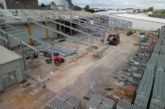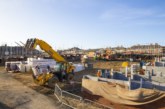
A year-long cross-party consultation investigating the issues of water shortages and flooding in England has recommended a Bricks and Water Sustainability Code be introduced ‘as a matter of urgency’.
The Westminster Sustainable Business Forum (WSBF) investigation, co-sponsored by the British Board of Agrément (BBA), highlighted that at present almost 4.5% of homes in England are at risk of flooding. By 2050 this number is projected to have grown by 129% to nearly 2.5m. Conversely, water shortages will become an increasing problem with predications that by 2050 demand will outstrip supply by 22%.
Inquiry Co-chairs Baroness McIntosh of Pickering and Angela Smith MP stated: “Building the number of homes we need has become a pressing issue…as we increase the number of new homes we must manage water sustainably and efficiently.
“WSBF’s inquiry into housing, water and planning policy strongly concludes that the Government needs to act now to improve guidance and standards for the houses that are being built. Water is a precious resource and we must use it wisely. The Government needs to ensure we are building the green, water-efficient, flood-resilient communities that our children and grandchildren deserve.”
In its Bricks and Water report, the WSBF made six recommendations:
- Government should introduce a fairer, tougher and simpler planning framework, supported by Building Regulations, to support all developers in delivering the highest water efficiency and flood resilience standards. This would form the Bricks and Water Sustainability Code.
- The proposed ‘environment watchdog’ strategic body proposed by the Environment Secretary must be independent, have the powers to hold government to account and provide leadership on water management.
- Water issues to be addressed at national level downwards with engagement between housebuilders, water companies, etc.
- Water efficiency, reuse and flood resilience to be driven up the agenda through mandatory Property Resilience Certificates (based on the BRE Home Quality Mark) and mandatory water efficiency labelling for fixtures and fittings.
- A national register of significant sustainable drainage systems (SuDS) to inform decisions and prioritise action, and the proposal in the draft National Planning Policy Framework on maintenance responsibility for green infrastructure should be firmed up and included in the Bricks and Water Sustainability Code.
- Post-CAP (Common Agricultural Policy) incentives developed by DEFRA to prioritise management of water as a public good, to ensure up-stream action in river catchments is taken to reduce flooding and improve water quality.








